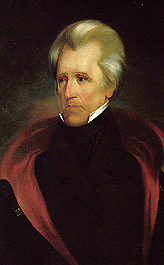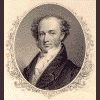

United States History 17A
Study Guide 8
 Assignments
Page
Assignments
Page
 Related
sites for this topic
Related
sites for this topic
 Previous or Next
Study
Guide
Previous or Next
Study
Guide
 Today
in United States History
Today
in United States History
 Study Guide 8
Nation of Nations
Chapter Eleven
Study Guide 8
Nation of Nations
Chapter Eleven
The Rise of Democracy
Answer the following questions:
1. In what ways did the new political system that
developed
after 1820 differ so strikingly from that of the early republic?
2. How did Franklin E. Plummer reflect this new
class
of
politician?
I. Equality and Opportunity
3. Coming from the more stratified society of
Europe,
what
were Europeans who visited the United States in this period struck by
most?
4. What were 3 democratic 'manners' of Americans
that
Europeans
found positively shocking?
5. How did Americans seem to feel about such
democratic behavior?
6. What did Americans mean by the term equality?
7. What happened in the Jacksonian era as result
of
fashionable
clothing becoming cheaper and much more widely available? How did
textile
mills play a role in this change?
8. By the 1830s, what was the prevailing color
for
men?
II. The New Political Culture of Democracy
The Second American Party System
As a consequence of the
collapse
of the
Federalist party after the War of 1812, a new party system gradually
began
to emerge. By the election of 1824, the National Republicans had
assumed
most of the platform of the Federalists. They advocated a strong
national
congress with implied powers, like a tariff, to protect manufaturers.
Their
opponents rallied around the new hero of the common man, Andrew
Jackson,
and called themselves Democrats. The Democratic party upheld the
tradition
of the old Jeffersonian Republicans and argued against a strong
national
congress. They preferrred to see political power remain with the
states,
and so opposed the concept of implied powers.
In summary, although the Federalists
and
Jeffersonian
Republicans had been replaced by the National Republicans and the
Democrats,
the beliefs of those older parties were still very much alive.
9. In the 1820s, which party became the heir of
the
beliefs
of the Federalists and of the Jeffersonian Republicans? What were those
beliefs?
10. What requirements for voters and
officeholders
were reduced
or dropped in the 1820s? How did these new democratic reforms affect
voter
turnout in1840 compared with 1824?
11. Why was the wealthy elite at a disadvantage
in
this new
political environment?
12. What frequently overshadowed issues in these
new
political
campaigns? What became an almost universal campaign tactic?
13. Even with these egalitarian conditions in the
age
of
the 'common man', who was still prevented from voting?
III. Jackson's Rise to Power
14. Look at the painting on p. 299 and read the
caption beneath
it. Besides the prevalence of drinking, (which explains why bars are
closed
and liquor not allowed within 100 feet of polling places on election
days
today), how were votes cast in elections in the Jacksonian era?
Also,
"election day remained an ___ event".
15. Identify the following information about
Andrew
Jackson:
From what college did he graduate? Where did he establish himself as a
large landowner and slaveholder? What was his nickname?
IV. Democracy and Race
16. In 1820, how many Indians remained east of
the
Mississippi?
Which 5 tribes still held millions of acres of prime cotton land?
17. How did attitudes toward Indians change after
1815?
18. How did the Cherokee John Ross deal with the
threats
of Indian removal? What eventually happened to him?
19. For what 2 reasons did Jackson prod the
Congress
for
Indian removal? When did Congress pass the Removal Bill?
20. In what 3 ways did the Georgia legislature
try to
harrass
the Cherokees?
21. What was the decision of Marshall's Supreme
Court
in
the case of Wocester v.Georgia in1832? What was Jackson's response to
this
case?
22. Who ordered the Cherokee romoval along the
'trail
of
tears' in 1838? How many Cherokees traveled on this trail?
23. On the 'trail of tears', what percent died
along
the
way of exposure, disease or exhaustion? What may have happened to as
much
as 90% of the western land allotments given to the tribes that were
removed?
24. Where in the north could black males vote on
equal terms
with whites?
25. In the years before the Civil War, what
percent
of the
northern population were free African Americans?
26. What were black exclusion laws passed by
several
western
states?
27. What 2 basic civil rights were denied to free
African-Americans
in the north by some or most states?
28. From what were free African-Americans
segregated
or forced
to occupy in corners or remote areas?
29. For what 2 reasons were white workers overtly
hostile
to black workers, forcing them into the lowest paying, and most
unskilled
jobs?
30. What three things resulted from free African
Americans
being forced into poverty?
31. What was the most popular form of
entertainment
in Jacksonian
America? What was featured in these shows?
32. How did the minstrel shows
contrast free
black
Americans
with those in slavery?
33. What was the basic message of the minstrel
shows?
V. The Nullification Crisis
34. Why was South Carolina particuarly hard-hit
by
the depression
of 1819? What was seen as the cause of its miseries?
35. What was the 'Tariff of Abominations'?
36. What did John C. Calhoun, of South Carolina,
argue in
his theory of nullification?
37. According to Senator Daniel Webster of
Massachusetts,
the doctrine of ___ gave ___ , not the states, the authority to
determine
the meaning of the Constitution.
38. What did a South Carolina convention do in
November of
1832?
39. In his response, called the 'Proclamation on
Nullification'
of December, 1832, what did Jackson add to Webster's argument against
nullification?
And what did he warn the citizens of South Carolina? What ended
the
Nullification Crisis?
VI. The Bank War
40. What did many farmers see as the cause of the
Depression
(sometimes called a Panic) of 1819?
41. What became a symbol for these farmers of the
rapid passing
of a simpler way of life?
42. Why were workers often critical of the paper
money system?
43. To avoid being cheated, what did workers call
for?
44. Of what was Jackson convinced about banks and
paper money?
45. What did Jackson do when Congress passed a
bill
to recharter
the Bank of the United States in 1832?
46. What did Jackson order Roger Tawney to do,
actions which
ultimately destroyed the Bank?
VII. Van Buren and Depression
Please go to the site, A
Revised American Party System, and answer the questions there.
 49. Who was the whig candidate who ran
successfully
for President
in the log cabin campaign of 1840, defeating the Democrat's Martin Van
Buren? How did the Whigs protray him to the people? What was untrue
about
this image?
50. The Whig campaign, by portraying the election
as
__ ,
was perfectly attuned to __?
49. Who was the whig candidate who ran
successfully
for President
in the log cabin campaign of 1840, defeating the Democrat's Martin Van
Buren? How did the Whigs protray him to the people? What was untrue
about
this image?
50. The Whig campaign, by portraying the election
as
__ ,
was perfectly attuned to __?

 Assignments
Page
Assignments
Page
 Revised March 17, 2008
Revised March 17, 2008
by Tom Gallup, e-mail address: [email protected]
West Valley College
http://www.westvalley.edu/wvc/ss/gallup/gallup.html



